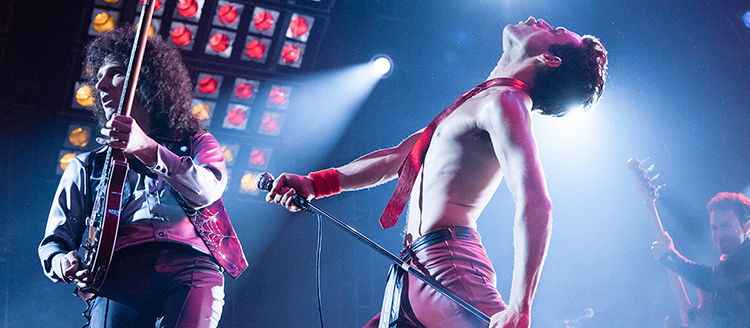Review: Bohemian Rhapsody

Director: Bryan Singer (fired) and Dexter Fletcher (replaced and uncredited)
Rami Malek won Best Actor in Leading Role, also nominated for Best Picture
Showing at The Music Hall as a sing-along March 28.
Freddie Mercury is one of the most talented rock singers of all time. It is no small feat to tell his story and live up to the grandeur of him. Bohemian Rhapsody takes a crack at telling the story of Freddie from the time he joined Queen in 1970 to their performance at Live Aid in 1985—a performance called “Queen’s best live show.”
Rami Malek oozes electric charm and awkward confidence in his turn as legendary Freddie. His lines are delivered with sincerity or venom, circumstance permitting. The only misstep is the fact that his prosthetic teeth—made to replicate Freddie’s extra incisors that caused his famous overbite—get the better of him in the beginning of the film. He tries to act around them but it’s too distracting for the audience. By midway and well into the Live Aid concert he has them figured out.
Watching the Live Aid concert is the most fun of the film. The props team had a time having to place exact replicas of everything from the Pepsi cups on Freddie’s piano to the green electrical tape on his microphone and they did a great job. Only eagle-eyed Queen-obsessed fans will be able to catch any mistakes. The performance is nearly an exact replica (with the exception of 2 cut songs) of the infamous 1985 performance, which raised nearly 50 million Pounds toward the African Famine. Malek brings energy to the role and is able to mimic Freddie’s mannerisms and movement to perfection.
To be honest, the best part of Bohemian Rhapsody is the Live Aid concert. The film itself is enjoyable but feels very formulaic. If you have seen nearly any band or musician biopic, then you know the formula. Misfit seeks acceptance, meet cute with band members, brilliance ensues, drugs and alcohol cause severe issues, but eventually, there is a triumphant return. This film is exactly that. Freddie finds massive fame and success with Queen but due to greed and his partying ways, the band is split up, eventually leading a sick and dying Freddie to apologize and stage a triumphant comeback at Live Aid. The only problem with this storyline is that the band never broke up nor had Freddie been diagnosed with AIDS yet. Much of the storyline and timeline is altered to serve the formula. It makes for an a-typical tale but not an accurate one.
Freddie Mercury is a musical legend but he is also a legend in the eyes of many LGBTQ people who looked out and saw a man who seemed completely comfortable with himself and his sexuality, choosing not to discuss it, not because he was ashamed, but because he wanted his music to be the focal point, not his personal life. I would have preferred to see more time with his long-term relationship with Jim Hutton and less of the typical dark and sinister film take on same-sex partners. However, a great deal of time is spent on Freddie’s relationship with Mary Austin (who was his fiancé and best friend until his dying day). The love demonstrated between Malek and Mary’s Lucy Boynton is sincere and at no point do you question their commitment to one another. Austin is shown as the person who really showed Freddie how to come into his own and be himself. Without Mary, there may have been no Freddie Mercury.
The film is not perfect but audiences who love Queen music will enjoy the scenes of those songs. They will bop their head to the bass line in “Another One Bites the Dust” and question how they got such a close imitation of Freddie’s vocals. Answer, by mixing vocals of Freddie from Queen’s master tapes, Malek’s own recorded vocals, and Canadian singer Marc Martel, whose voice is a dead ringer for Freddie’s. Go. See it. Enjoy it. Sing along.
